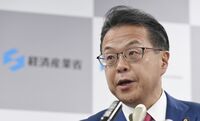
Taro Kono, left, shakes hands with Kang Kyung-wha in Bangkok. Photographer: Lee Jung-hoon/Yonhap via AP
South Korea warned Japan it would be responsible for repercussions from its unprecedented decision to remove Seoul from a list of trusted export destinations, as escalating tensions between the two U.S. allies threaten to damage security ties and global supply lines.
South Korea fired back by saying it would take Japan off of its easy-trade list. President Moon Jae-in said Japan’s move on Friday was clearly intended to block his country’s growth and made despite U.S. proposals to intervene. He spoke hours after Japanese Prime Minister Shinzo Abe’s cabinet struck its neighbor from a so-called “white list” of countries that benefit from less stringent checks and said the removal will take effect Aug. 28.

Moon Jae-in speaks at an emergency cabinet meeting.
“Japan has rejected our diplomatic efforts to solve the problem, and took a reckless decision to worsen the situation,” Moon said in comments delivered after an emergency cabinet meeting. “Our government warns that Japan is fully responsible for what will happen next.”
Protesters took to the streets outside the Japanese embassy in Seoul shortly after Tokyo announced the move and more rallies are on tap for the weekend. Tokyo has said its neighbor is lax on management of sensitive materials and that its move is a matter of national security. Seoul denies the claim of improper controls.

Hiroshige Seko speaks in Tokyo Friday.
Trade Minister Hiroshige Seko told reporters that Japan didn’t intend the move to affect relations with South Korea and Tokyo has thoroughly explained to the U.S. and other relevant countries its revised rules for handling exports to South Korea. “This is a revision of the way we manage export controls based on the fact that there are some inadequacies in South Korea’s export control system,” Seko told reporters.
Japanese officials have argued that the changes wouldn’t have much long-term effect on legitimate exports. But the matter has been seen by Seoul as having major implications for its already struggling economy.
Economists at Goldman Sachs Group Inc. and Bank of America Merrill Lynch have also argued any disruptions from Japan’s tighter export regulations are likely to be short-lived.
The move is expected to affect about 900 or more products, including building materials, chemicals and technology components. Most of the top 20 items needed for South Korea’s technology industry are highly dependent on Japanese suppliers, such as scrap steel, medical equipment, plastics and some chemical products, according to SK Securities.
Growing Tension
South Korea’s two tech giants, Samsung Electronics Co. and SK Hynix Inc., are already struggling with the earlier export restrictions. Shares of Samsung fell as much as 2% in Seoul on Friday, while Hynix dropped as much as 3% after the Tokyo move.
The decision came as U.S. Secretary of State Mike Pompeo is set to meet with his counterparts from the two countries -- Japan’s Taro Kono and South Korea’s Kang Kyung-wha -- on the sidelines of a regional forum in Bangkok later Friday. A senior U.S. official in Washington said this week the Trump administration was urging the two sides to reach a “standstill agreement” to give themselves room to negotiate.
Five of America’s largest tech industry groups have written a joint letter to the trade ministers of Japan and South Korea seeking to cool tensions they said threaten global production, saying too much was at stake.
Long-fraught ties between Japan and South Korea have turned increasingly sour in recent months, potentially hampering their ability to work together to counter threats from North Korea and China. Much of the ill will relates to whether Japan has shown sufficient contrition for its 1910-45 occupation of the Korean Peninsula.
Japan was incensed by South Korean court rulings holding Japanese companies liable for cases of forced labor during the colonial period. The Japanese government says all such claims were settled under a 1965 treaty, while South Korean courts have said the agreement did not cover the emotional pain and distress.
No comments:
Post a Comment